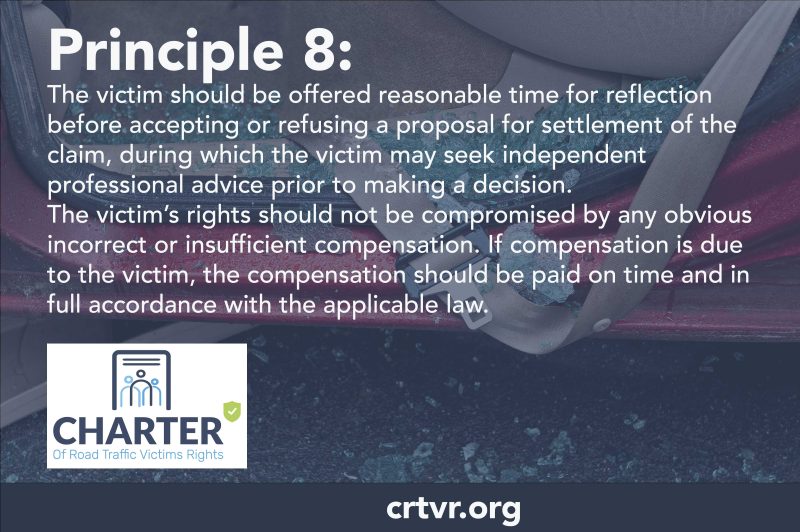Principle 8:
The victim should be offered reasonable time for reflection before accepting or refusing a proposal for settlement of the claim, during which the victim may seek independent professional advice prior to making a decision.
The victim’s rights should not be compromised by any obvious incorrect or insufficient compensation. If compensation is due to the victim, the compensation should be paid on time and in full accordance with the applicable law.
Time for the victims to consider. At its core, that is the idea behind Principle 8 of the Charter of Road Traffic Victims’ Rights. Victims shouldn’t be subjected to time pressure in order to consider an offer of compensation. Principle 8 seeks to stop that particular clock from applying.
In the past, there may have been examples where compensating parties approached the victim soon after the accident and encouraged them to accept a sum of money which would act as ‘final’ compensation for the damage suffered. Such an offer may have been made under the guise of a “take it or leave it” ultimatum, which would have added an extra level of pressure on the victim. The sense may have arisen that if they didn’t take this sum they could end up with nothing.
However, the victim may also not have the full information available to them at the time they faced such a decision. For example, in the case of personal injuries, it may not have been possible to assess the total compensation required at that point in time.
While this certainly wasn’t a widespread practice, unfortunately there were occasions when it did happen. The impetus for Principle 8 is to stop such scenarios from arising. The Charter doesn’t want further pressure along these lines being exerted on victims.
Rather, Principle 8 wants victims to be able to take their time making these decisions. They should be able to first get the right advice and then decide on the best path for them to take.
Often that will involve consulting with outside experts (or taking “independent professional advice”). This might include doctors, medical specialists, lawyers, legal aid insurers, professional claims handling offices and others. Seeking out such expertise will require a waiting period and the victims should not feel pressurised while those processes are in motion.
The Charter envisions the ideal of ‘restitutio in integrum’ or full compensation of the victim is provided – aiming to put the victim back in the position they would have been in had the accident not occurred. So compensating parties should not offer amounts they know will be insufficient in the guise of providing a quick solution.
Of course, none of this is to say that compensating parties should not act swiftly. Principle 4 of the Charter already makes it clear that a victim’s claim should be handled diligently. Victims should receive a reasoned reply and/ or reasoned offer in a reasonable timescale. The key term there though is ‘reasoned’. Acting swiftly shouldn’t be a disguise that enables the compensating parties to save money on the compensation that will be required. In fact, if they are offering money in the short term in the case of complex claims, that should be more of an interim, advance payment as set out in Principle 7.
In the spirit of balance also conveyed by the Charter, it should be noted that the victims shouldn’t leave it too long to make their decision either. When they have had the time to conduct sufficient diligence then they should act. Otherwise the compensating party may be held to pay interest for the entire period the victim does not react. This may result in the compensating party making reservations for the future payment of interests.
In summary, rather than a ‘take it or leave it’ approach applying to offers of compensation, Principle 8 of the Charter of Road Traffic Victims’ Rights instead sets out a different ideal, victims should be able to ‘consider it and then make an informed decision’. A decision informed by reason.


